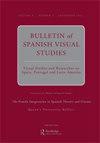西班牙Transición纪录片的再政治化:图像、再现与数字时代*
Q4 Arts and Humanities
引用次数: 2
摘要
摘要2008年的金融危机和由此引发的旷日持久的社会政治危机在西班牙新一代电影制作人最近的纪录片中得到了政治表达。他们的作品通过反映20世纪70年代的视觉描述,将他们当前的政治斗争概念化,这些视觉描述被排除在西班牙向民主过渡的主流话语之外。这些纪录片制作人中的许多人公开借用了那段时期的图像,并通过挪用和重新政治化Transición之前从未见过的镜头,揭露了这一过程的缺陷以及后者对西班牙民主的顽强影响。本文将通过分析分别来自安达卢西亚、加利西亚、加泰罗尼亚和巴斯克地区的四部纪录片,从区域角度审视挪用策略:El caso‘Rocío’(JoséLuis Tirado,2013)Cine Clube Carlos Varela(Ramiro Ledo Cordeiro,2005),La matança del porc(Isaki Lacuesta,2012)和Democráticos tiranos(Chema Mascareña制作的集体作品,2013)。本文章由计算机程序翻译,如有差异,请以英文原文为准。
Re-politicizing Documentary Footage from the Transición in Spain: Images, Representation and the Digital Age*
Abstract The 2008 financial debacle and the resulting protracted socio-political crisis have found political expression in the recent documentaries of a new generation of Spanish film-makers. Their body of work conceptualizes their current political struggles by mirroring visual accounts of the 1970s that were excluded from the dominant discourses on the Spanish transition to democracy. Many of these documentary film-makers openly borrow images from that period, and by appropriating and re-politicizing this previously unseen footage from the Transición, they expose the deficiencies of the process and the latter’s tenacious impact on Spain’s democracy. This essay will examine strategies of appropriation from a regional perspective by analysing four documentaries from Andalusia, Galicia, Catalonia and the Basque Country respectively: El caso ‘Rocío’ (José Luis Tirado, 2013) Cine Clube Carlos Varela (Ramiro Ledo Cordeiro, 2005), La matança del porc (Isaki Lacuesta, 2012) and Democráticos tiranos (a collective work produced by Chema Mascareña, 2013).
求助全文
通过发布文献求助,成功后即可免费获取论文全文。
去求助
来源期刊

Bulletin of Spanish Visual Studies
Arts and Humanities-Visual Arts and Performing Arts
CiteScore
0.20
自引率
0.00%
发文量
15
 求助内容:
求助内容: 应助结果提醒方式:
应助结果提醒方式:


